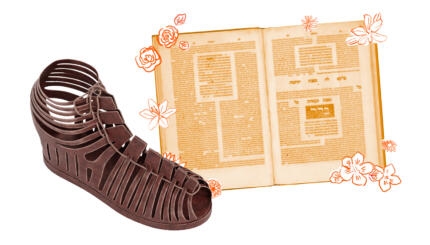The mishnah on today’s daf discusses exactly what kinds of brothers are required to perform yibbum:
Anyone who has a brother of any kind, that brother creates a levirate bond causing his yevama to be required to perform levirate marriage. And he is his brother in all respects, except for one who has a brother from an enslaved woman or from a gentile woman.
According to the mishnah, children follow the legal status of their mothers — so the son of an enslaved woman is himself enslaved, and the son of a non-Jewish woman is not Jewish. Since yibbum is only a requirement for those who are Jewish and free to contract a marriage, these two kinds of brothers are exempt from yibbum.
But all other brothers — those who are Jewish and free — require the widow of a childless man to perform yibbum or halitzah.
With your help, My Jewish Learning can provide endless opportunities for learning, connection and discovery.
The Gemara notes that the mishnah’s phrase “of any kind” seems redundant. Why not just say “anyone who has a brother” — and the next sentence makes clear that we mean a free and Jewish brother?
“Of any kind” — what does this add?
Rav Yehuda said: This adds a mamzer.
A mamzer, a child born of a forbidden sexual relationship, is often treated differently in halakhah. So Rav Yehuda read the redundant words as meant to clarify that a mamzer counts as a brother for yibbum purposes.
But isn’t that obvious? He is his brother. Lest you say: Let us derive a verbal analogy between the word “brother” stated in the verse with regard to levirate marriage and “brother” stated with regard to the children of Jacob. Just as there, Jacob’s children are of unflawed lineage, so too here, we refer to unflawed lineage and not brothers of flawed lineage. This teaches us that a mamzer counts for yibbum.
The rabbis are worried that one might make a false verbal analogy from Jacob’s children, who are definitely not mamzerim, to the brothers of the deceased man and think that they must also be definitely not mamzerim. So Rav Yehuda has to say explicitly that mamzerim count as brothers.
The first time I read this daf, I laughed out loud. As we’ve already seen, Leviticus 18 states that “you shall not marry two sisters.” Of course, that’s exactly what Jacob did when he married Rachel and Leah. No shade to Jacob — according to the biblical chronology, the Torah had not yet been given, and he was not subject to the laws in Leviticus. But let’s be honest, if Jacob had lived a thousand years later, some of his children would in fact have been mamzerim. So using Jacob’s children as our model for an unflawed family lineage is a tad ironic.
But that choice actually tells us something important about how the rabbis think about family. For the rabbis, family isn’t just something biological. If it was, the children of non-Jewish women and enslaved women would have counted. It’s something contextual. Definitions of family change over time with the revelation at Sinai and continued rabbinic interpretation.
The mishnah shines a light onto the complicated family dynamics of slaveholders. Enslaved women don’t have the legal right to refuse and may have children by their enslavers. Those children then occupy a strange position in the family, recognized as biologically related but not halakhically considered brothers for the purposes of yibbum. Their exclusion hurts everyone — they are excluded from inheritance and a range of legal protections, and if they are the only biological brother of the deceased, they cannot perform yibbum and give their brother a legacy. But the rabbis’ discussion of Jacob reminds us that definitions of family can and do change. As they should.
Read all of Yevamot 22 on Sefaria.
This piece originally appeared in a My Jewish Learning Daf Yomi email newsletter sent on March 29th, 2022. If you are interested in receiving the newsletter, sign up here.



